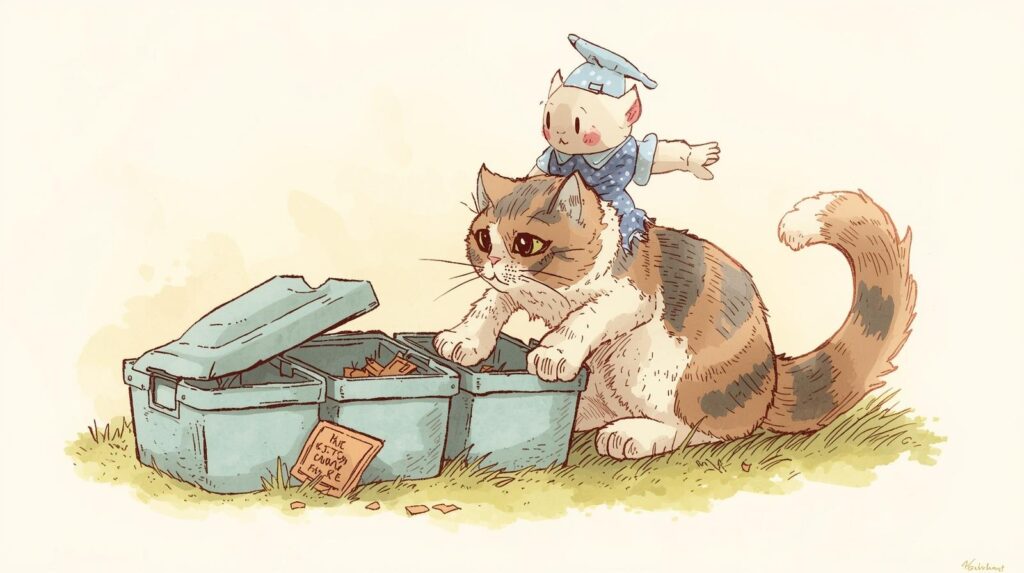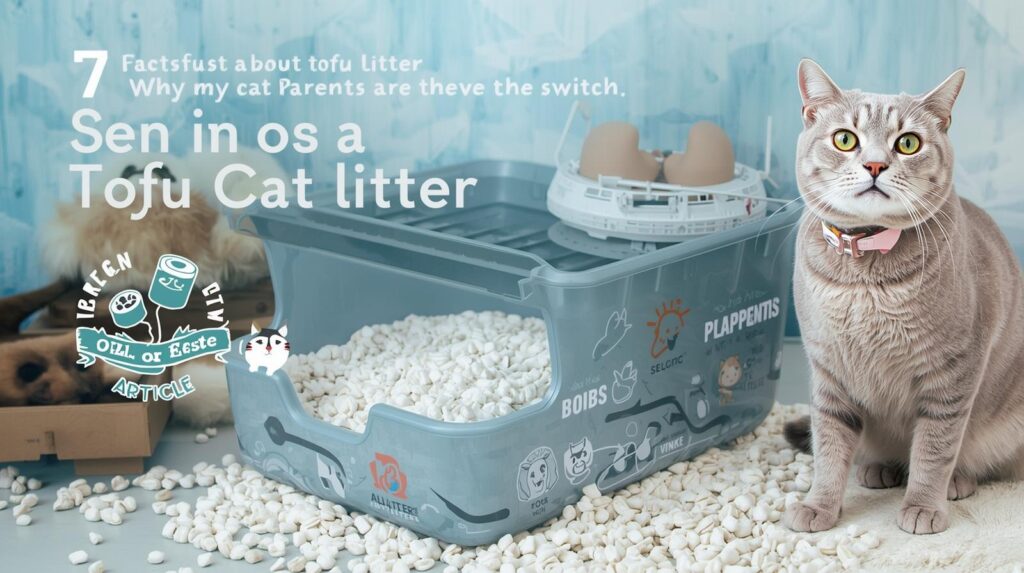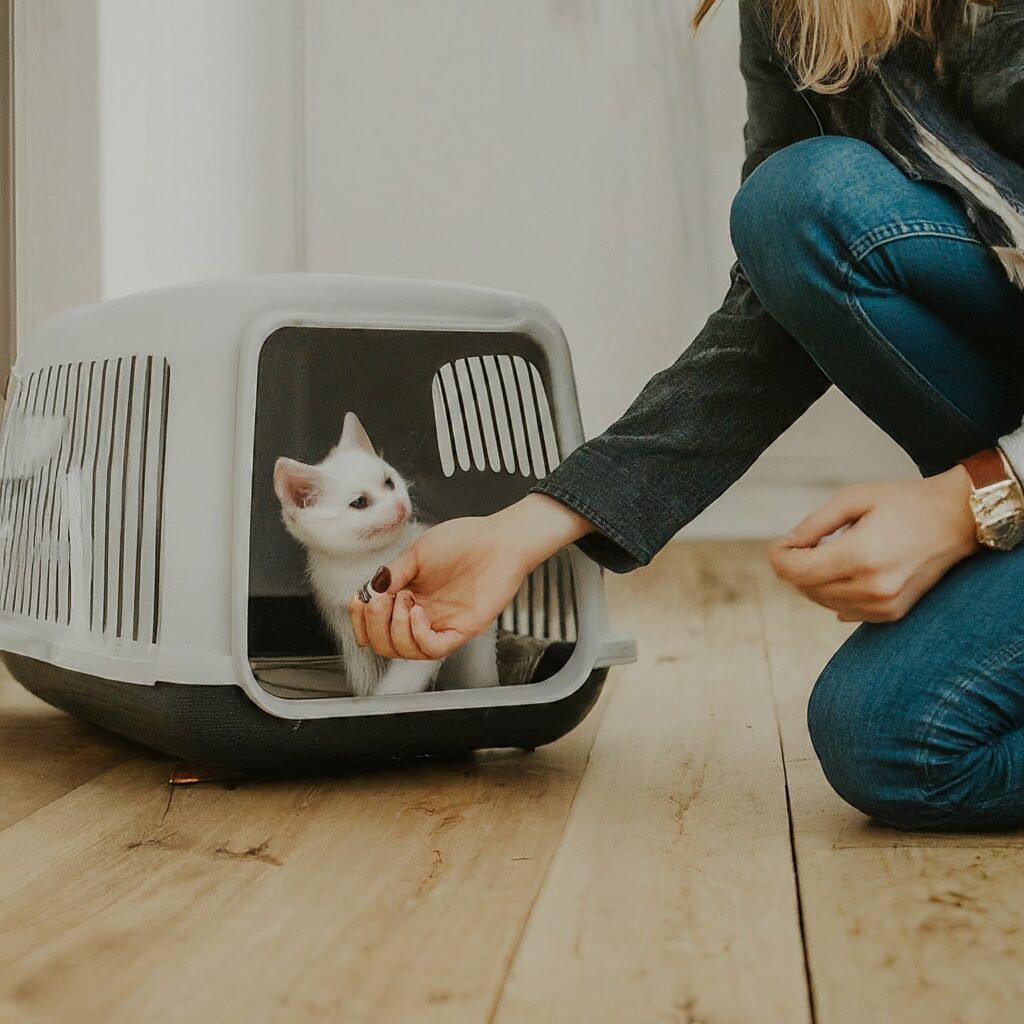
Cats are usually very clean pets, so when they suddenly stop using the litter box and start urinating on the floor, carpet, bed, or couch, it worries every cat owner. If you’re wondering “Why Is My Cat Peeing Outside the Litter Box?”, the most important thing to know is this:
your cat is not doing it out of revenge — it is a sign of stress, health trouble, or a problem with the litter setup.
In most cases, cats pee outside the litter box because:
- Something medical is making peeing painful
- The litter box feels unsafe or too dirty
- There is stress, anxiety, or territorial conflict
- Sudden home or routine changes
- Wrong litter type, box size, or placement
To answer the core question “Why Is My Cat Peeing Outside the Litter Box?”, the real reason is almost always communication — your cat is telling you, “Something is wrong.” Your job is to decode the message.
In this full guide, you’ll learn how to identify the root cause, fix the environment, prevent future accidents, and get your cat confidently using the litter box again using vet-approved methods. By the end, you’ll clearly understand Why Is My Cat Peeing Outside the Litter Box? and how to solve it gently and permanently.
I write with love and care, keeping your furry friend’s health first and following the doctor’s guidance. If it helps, share it—because health and knowledge grow stronger when we share them within our community.
Table of Contents
Is My Cat Doing This on Purpose or Is It a Health Problem?
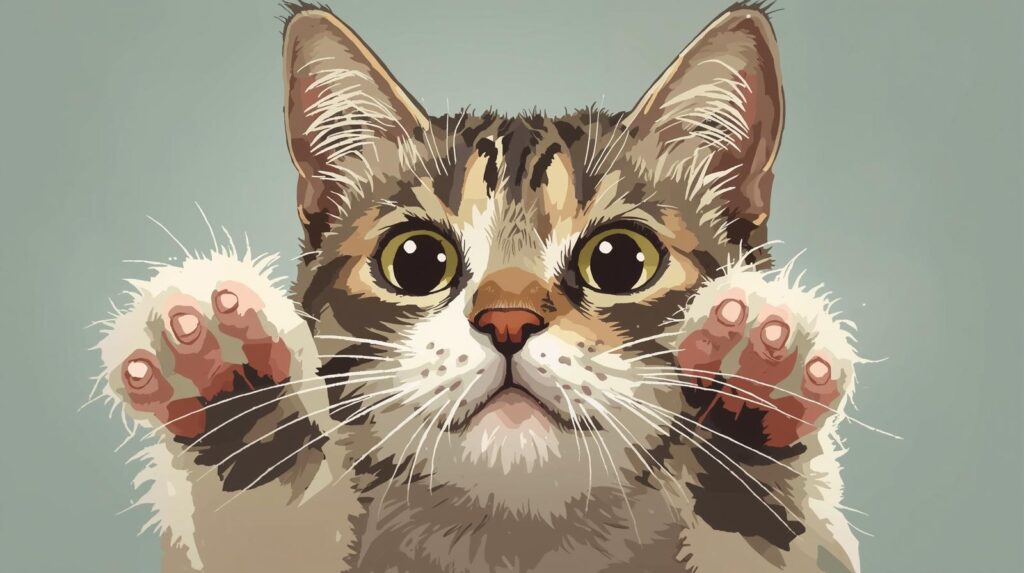
Before fixing anything, you must first understand why your cat is peeing outside the familiar space of the litter box.
Many cat owners think it is “misbehaviour” or “jealousy.” Still, veterinarians confirm that cats do not pee outside the box out of spite — they do it because something is wrong physically or emotionally.
When trying to answer Why Is My Cat Peeing Outside the Litter Box?, the first rule is:
Always check for medical causes first before assuming it’s a behaviour issue.
Medical vs Behavioural — Simple Breakdown
| Situation | What It Means |
|---|---|
| Peeing small drops often | Pain, UTI, bladder inflammation |
| Peeing outside but still using box sometimes | Litter setup or stress |
| Crying while peeing | Medical (urgent vet check) |
| Blood in urine | Emergency |
| Only peeing on soft things (bed, clothes, rug) | Comfort-seeking / anxiety |
| Peeing outside but still using the box sometimes | Cat squats near the box but doesn’t enter |
If your cat suddenly changes habits, the safest assumption is physical discomfort until proven otherwise. That’s why knowing Why Is My Cat Peeing Outside the Litter Box? helps prevent frustration and avoids punishing your pet for something it cannot control.
Why Medical Problems Are the #1 Hidden Cause
Cats are experts at hiding pain. When urinating begins to hurt, they stop using the litter box because they start to associate the box with pain. They think:
“When I pee in the litter box, it hurts… so maybe I should try elsewhere.”
This avoidance leads to Inappropriate Elimination — a very common condition where a cat pees anywhere except the litter box because it believes the box is part of the problem.
That’s why many owners repeatedly ask themselves Why Is My Cat Peeing Outside the Litter Box? even after cleaning or changing litters — the root cause hasn’t been addressed.
Red Flags That Suggest a Medical Issue
- Peeing more frequently or hardly peeing at all
- Straining or sitting for too long in the box
- Licking the genitals excessively
- Strong ammonia smell / cloudy urine
- Visiting the litter box repeatedly but not producing urine
- Sudden accidents in multiple areas of the house
If your cat shows any of these signs, a vet visit is recommended first, because delay can make the condition worse.
Once medical causes are ruled out, we move to behavioural and environmental reasons, which we will cover in the next sections.
Mini-Checklist: Medical or Not?
| Question | If YES, think Medical |
|---|---|
| Did the peeing start suddenly? | ✅ |
| Is the cat straining or crying in the box? | ✅ |
| Does the cat run out of the box quickly? | ✅ |
| Has water intake increased? | ✅ |
| Is the cat older or overweight? | ✅ |
If no medical symptoms appear, then we start solving environmental and emotional triggers.
When Peeing Outside the Box Is a Health Warning
When trying to understand Why Is My Cat Peeing Outside the Litter Box?, the most common root cause is medical discomfort — especially when the behavior starts suddenly. Many health conditions make urination painful, frequent, or urgent, forcing your cat to choose anywhere except the litter box.
Below are the most common medical conditions linked to this issue:
1. UTI (Urinary Tract Infection)
UTIs are painful and cause frequent urges to pee — even when the bladder is almost empty. Your cat may squat again and again but only dribble a few drops.
Signs:
- Strong urine smell
- Frequent but small urination
- Avoiding the litter box due to pain memory
2. FLUTD (Feline Lower Urinary Tract Disease)
This condition is extremely common and often stress-triggered. It causes inflammation in the bladder, and cats start urinating in multiple places because they cannot hold it.
Signs:
- Sudden accidents around the house
- Licking the genital area
- Restlessness or hiding
3. Bladder Stones / Crystals
Crystals make urination sharp and painful, like tiny glass pieces passing through the urethra. The cat avoids the litter box because it thinks the box is causing the pain.
Signs:
- Blood in urine
- Crying or meowing while peeing
- Squatting for long periods
4. Kidney Disease (common in older cats)
Kidney problems cause your cat to drink more water and pee larger volumes, sometimes failing to reach the litter box in time.
Signs:
- Excessive thirst
- Very frequent urination
- Accidents near the box, not far away
5. Diabetes
Just like kidney disease, diabetes leads to more urination. If your cat is overweight, older, or always hungry but losing weight, diabetes might be the hidden cause.
Male Cats Face a Life-Threatening Risk
Male cats can block (urinary blockage), which is an emergency. If no urine comes out despite frequent attempts, immediate vet care is required. A blocked urethra can be fatal within 24–48 hours.
When Should You See a Vet Immediately?
| Symptom | Action |
|---|---|
| No urine coming out | Emergency |
| Blood in urine | Urgent |
| Crying while urinating | Urgent |
| Constant trips to box | Urgent |
| Heavy licking of genitals | Likely medical |
| Peeing right in front of you | Sign of distress |
If medical causes are ruled out, then the next big category is behaviour and emotional triggers, which are equally important.
When Stress or Emotion Triggers Peeing Outside the Box
Once medical issues are ruled out, the next step in answering Why Is My Cat Peeing Outside the Litter Box? is understanding behavioural and emotional triggers. Cats are highly sensitive animals, and even small changes in the environment can make them feel unsafe or anxious — leading to pee accidents.
This is not “bad behaviour.” It is a coping behaviour.
A stressed cat tries to feel secure by marking areas with its scent.
1. Stress and Anxiety
Sudden changes such as moving homes, loud noises, visitors, or a new pet can trigger anxiety. Cats seek comfort in soft or familiar-smelling places — like a bed, sofa, pile of clothes, or rug.
This makes many owners wonder:
“Why Is My Cat Peeing Outside the Litter Box?”
→ Because stress is telling the cat to “self-soothe” using scent.
2. Territory and Competition (Multi-Cat Homes)
In multi-cat households, peeing outside the litter box is often a territory dispute, not a bathroom problem. One cat may feel bullied, blocked, or unsafe entering the litter box, especially if it’s covered or placed in a corner where escape is difficult.
Cats don’t like using a box if:
- Another cat guards the entry
- The box location feels trapped
- They must “share” one box
This leads to Inappropriate Elimination as a way of reclaiming territory.
3. Routine or Environment Changes
Even small changes can stress a cat:
- New furniture
- Change in litter type or smell
- A baby arriving
- House guests
- Rearranging rooms
- Different feeding times
Cats thrive on predictability. Any disruption can make the litter box feel “wrong,” even if nothing is physically wrong with it.
4. Negative Past Experience with the Litter Box
If your cat was startled by noise (washing machine, barking dog, sudden slam) while inside the litter box, the cat may now associate the box with panic — and avoid it.
This is why understanding Why Is My Cat Peeing Outside the Litter Box? is not just about the box itself, but the emotional feeling tied to it.
5. Cats Who Have “Location Preference”
Some cats prefer quiet corners, hidden areas, or soft places. If the litter box doesn’t feel private enough, they choose a new “bathroom zone” that feels safer.
Common target areas:
- Behind curtains
- On piles of laundry
- On fluffy rugs
- In closets
- On the owner’s bed (seeking comfort)
How to Tell if It’s Behavioural (Not Medical)
| Sign | Meaning |
|---|---|
| Cat pees in SAME spot repeatedly | Behavioral |
| Happening after a home change | Stress |
| Occurs when guests visit | Anxiety |
| Happens only around other pets | Territory |
| Cat uses litter box sometimes | Preference problem |
If the cat still uses the litter box occasionally, the problem is usually behaviour or environment, not health.
Environmental & Litter Box Setup Problems
Even if your cat is healthy and not anxious, the environment around the litter box can still make them avoid it. Many owners don’t realise that cats have very specific preferences when it comes to bathroom setup — and if even one part feels “wrong,” they will pee elsewhere.
So when asking Why Is My Cat Peeing Outside the Litter Box?, a HUGE part of the answer is simply:
“Because the litter box doesn’t feel right to them.”
1. Wrong Placement of the Box
Cats hate peeing in noisy, crowded, or trapped areas.
Avoid placing the litter box:
- Next to washing machines
- In hallways with foot traffic
- Near the food or water bowls
- In dark basements where smells linger
- In tiny corners with no escape route
They prefer:
- Quiet
- Visible exits
- No surprise predators (like dogs)
- Low-stress zones
2. Dirty Box or Bad Odor
Cats have a much stronger sense of smell than humans. Even if it “looks” clean to you, it may smell dirty to them.
If the litter box is not scooped daily, many cats simply refuse to use it.
Rule of thumb: scoop twice a day, deep clean weekly
3. Covered vs Uncovered Box
Some cats feel “trapped” inside covered boxes. Others don’t like the smell getting stuck inside the cover.
If your cat avoids the box, try switching to an uncovered model.
4. Wrong Litter Type or Texture
Cats prefer soft, sand-like textures. If litter feels too rough, scented, dusty, or sticky, they’ll avoid it.
The question “Why Is My Cat Peeing Outside the Litter Box?” often has a surprisingly simple fix:
change the litter type to an unscented, softer formula.
5. Box Size Is Too Small
A litter box should be at least 1.5x the cat’s body length.
Many store-bought boxes are too cramped, forcing a cat to step in old urine or faeces, which triggers avoidance.
6. Not Enough Boxes in Multi-Cat Homes
If you have multiple cats, one box is never enough.
The vet-recommended formula:
# of cats + 1 = number of litter boxes
Two cats? → 3 boxes
Three cats? → 4 boxes
This prevents territory guarding and bullying near the litter box.
Quick Environmental Checklist
| Problem | Fix |
|---|---|
| Box too small | Get a larger open tray |
| Box too smelly | Scoop twice daily |
| Wrong location | Move to quiet/private area |
| Only 1 box for many cats | Add more |
| Wrong litter type | Switch to softer, unscented |
| Covered box discomfort | Try uncovered |
Practical Solutions & Prevention (How to Get Your Cat Back to the Box)
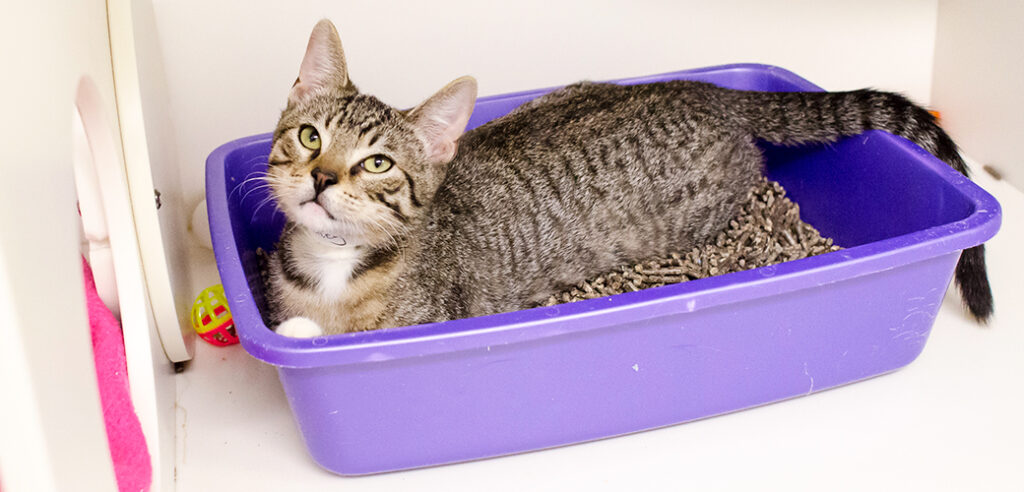
Now that we understand the common triggers, let’s solve the real question:
Why Is My Cat Peeing Outside the Litter Box? — and how do we stop it long-term?
The goal is to make the litter box feel safe, clean, easy to access, and stress-free, so your cat chooses it willingly again.
Step-by-Step Fixing Strategy (Vet-Approved)
Step 1: Rule Out Medical Causes First
If peeing started suddenly, if there is straining, blood, crying, or frequent trips to the litter box, a vet check is the FIRST step.
Once pain is treated, most cats return to the litter box naturally.
Step 2: Deep Clean Accident Spots (Remove Scent Memory)
If urine scent remains, the cat thinks, “This is now a bathroom.”
Use enzymatic cleaners — NOT bleach — to erase scent marking and prevent repeat accidents.
Step 3: Improve the Litter Box Setup
A healthy litter box environment should be:
- Large enough
- Easy to enter
- Low-odor
- Quiet & private
- Soft-textured litter
- Cleaned daily
Even small changes — like switching to unscented litter or moving the litter box to a calmer spot — can fix the issue quickly.
Step 4: Add More Boxes (If Multi-Cat Home)
Use the vet rule: cats + 1
If two cats share the same litter box, one may feel blocked or unsafe, which triggers Inappropriate Elimination elsewhere.
Should You Discipline a Cat for Peeing Outside the Litter Box?
This is one of the MOST misunderstood parts of the problem.
Many frustrated owners think the only solution is to scold or punish — but punishment actually makes the behaviour worse and increases anxiety.
When you ask “Why Is My Cat Peeing Outside the Litter Box?”, the LAST thing you should do is discipline the cat. Because:
| Punishment does this | Instead of fixing |
|---|---|
| Increases fear | Does NOT solve cause |
| Damages trust | Makes cat hide to pee |
| Raises anxiety | More accidents happen |
| Confuses the cat | No link to the box problem |
Your cat is not “being naughty” — it is trying to communicate discomfort.
Why Punishment Backfires
When owners yell, chase, or spray water, the cat learns:
“Peeing near humans is scary — I should hide and pee elsewhere.”
So the behaviour goes underground:
- Behind furniture
- In corners
- Under beds
- In closets
This makes it harder to fix.
What Works Instead (Gentle Behaviour Correction)
| Wrong Approach | Correct Alternative |
|---|---|
| Forcing a cat to sniff pee | Calm redirection |
| Locking a cat in a room | Enzymatic cleaning |
| Moving the box randomly | Providing safe area |
| Providing a safe area | Strategic placement |
| Punishing | Scolding/shouting |
Positive Reinforcement Tips
You can retrain your cat to choose the litter box again by:
- Rewarding (treats/praise) after using the box
- Keeping the box clean and stress-free
- Providing a second box option
- Making the spot feel “safe” again
- Soft lighting + quiet area
This restores confidence and helps undo box avoidance.
When Peeing Outside the Box Gets More Complicated
Sometimes the answer to Why Is My Cat Peeing Outside the Litter Box? is not “one simple reason” — it’s a combination of health, age, history, or environment. These special cases need slightly different approaches.
1. Senior / Older Cats (Mobility Problems)
As cats age, joints become stiff and painful. If the litter box has high sides or is far away, the cat may avoid it because climbing in hurts.
Fixes for seniors:
- Use a low-entry litter box
- Keep the litter box on the same floor (no stairs)
- Place night lights nearby so they can see easily
- Softer litter for delicate paws
Older cats don’t “forget training” — they physically struggle to reach or enter the box.
2. Overweight Cats
Overweight cats often have trouble squatting or turning around inside a cramped litter box, so they “half-enter, half-pee outside,” or find another spot.
Fix:
- XL-size litter box
- Open design for easy entry
- Wider space to turn comfortably
3. Rescue / Shelter Cats (Trauma or Past Neglect)
Cats who lived outdoors or in crowded shelters may not understand what a litter box is for — or they may associate boxes with stress because of bad past experiences.
Fix:
- Use soft, sand-like litter that mimics natural soil
- Provide multiple quiet boxes to build confidence
- Reward after successful use
Positive association is everything for trauma cats.
4. Cats Bullied by Other Pets
A very common hidden reason behind Inappropriate Elimination is silent bullying.
One cat may “guard” the litter box, blocking access. The victim cat then searches for a safer location.
Fixes:
- Provide multiple litter box locations
- Ensure open visibility (not covered/trapped)
- Place boxes in opposite corners of the home
- Give the timid cat a safe path
5. Spraying vs Peeing (Territory Issue)
Spraying = vertical (walls/doors)
Peeing = horizontal (floor/bed)
If your cat is spraying walls, it’s a territory or stress problem, not a bathroom problem.
This is another reason owners ask Why Is My Cat Peeing Outside the Litter Box? — but it may actually be scent-marking, not urination behaviour.
When These Special Cases Require Vet or Behaviourist Support
| Situation | Get Professional Help |
|---|---|
| Peeing + crying | Likely medical |
| Senior cat stops using box | Pain or arthritis |
| Constant territorial marking | Behaviorist |
| Multi-cat fighting | Territory mapping needed |
| Urine in multiple rooms daily | Vet + stress plan |
Veterinary guidance products for you
Good large open litter box: A basic open tray (large size, low rim) is often more acceptable to cats than a fully covered box. (While I don’t have a specific brand from product lookup here, you can look for “extra large open cat litter box” with measurements 23–25 inches long, as vets recommend.)
Unscented clumping litter: According to vet-recommendations from [turn0search6] and [turn0search4], non-scented clumping litter is a strong pick for many cats.
Odor neutraliser / deodoriser additive: For example, an enzymatic spray or additive for the litter box area helps remove lingering scent-triggers.
High-quality scoop: A durable metal scoop helps you keep the litter box clean more easily. Good hygiene helps the cat feel safe returning to the box.
Further readings
How fast can maggots kill a cat naturally
FAQs: Why Is My Cat Peeing Outside the Litter Box? 9 insights Must know
Why did my cat suddenly stop using the litter box?
A sudden change usually means stress, a new smell, pain, or a medical problem like UTI. Cats never pee outside the litter box “for no reason.” Your first step is always ruling out health issues with a vet.
Can a dirty litter box make a cat pee elsewhere?
Yes! Cats are very clean animals. If the litter box smells, is too full, or isn’t scooped daily, they will avoid it and look for somewhere else — like rugs, beds, or corners.
Do cats pee outside the box when stressed?
Yes. Stress and anxiety are top behavioral causes. Moving furniture, new pets, loud noises, or even a new smell can make a cat stop using the litter box because they don’t feel safe.
Could the location of the litter box be the problem?
Absolutely. If the litter box is in a noisy hallway, near washing machines, or where kids and dogs disturb your cat, your cat may avoid it. Place it in a quiet, low-stress area where the cat feels safe.
What if the litter box is too small?
A box that feels cramped or uncomfortable will cause avoidance. Vets recommend a litter box that is 1.5× your cat’s body length. Small or covered boxes can also trap unwanted odor inside, which makes the box uninviting.
Can the smell of the litter itself make a cat refuse the litter box?
Yes. Strong perfumes or scented litter may overwhelm your cat’s sensitive nose. Most vets recommend unscented litter because cats prefer natural smells over chemical fragrances.
How many litter box setups should I have in my home?
The golden rule is:
# of cats + 1
For one cat → two litter box setups
For two cats → three litter box setups
More boxes = less stress and fewer accidents.
Why is my male cat peeing everywhere and meowing a lot?
This could signal a urinary blockage, which is life-threatening. Seek emergency vet care immediately. If the vet rules out medical issues, it may be marking behavior. Neutering usually helps.
Should I punish my cat for peeing outside the litter box?
No. Punishment increases stress and makes the problem worse. Instead, use positive reinforcement and fix the underlying issue.
How many litter boxes do I need?
Rule of thumb: One box per cat, plus one extra. For two cats, that means three boxes in different locations.
Wrap Up
When you ask “Why Is My Cat Peeing Outside the Litter Box?”, the most important thing to remember is this:
Your cat is not being naughty — they are communicating.
Cats use urination as a signal, not a misbehaviour. It could mean:
- “I am in pain.”
- “This litter box doesn’t feel safe.”
- “Something in my home changed, and I’m stressed.”
- “I don’t like this type of litter.”
- “I can’t reach or enter the litter box easily.”
- “I am marking because I feel insecure.”
Once you identify the root cause — medical or behavioural — the solution becomes much easier.
I write with love and care, keeping your furry friend’s health first and following the doctor’s guidance. If it helps, share it—because health and knowledge grow stronger when we share them within our community.

